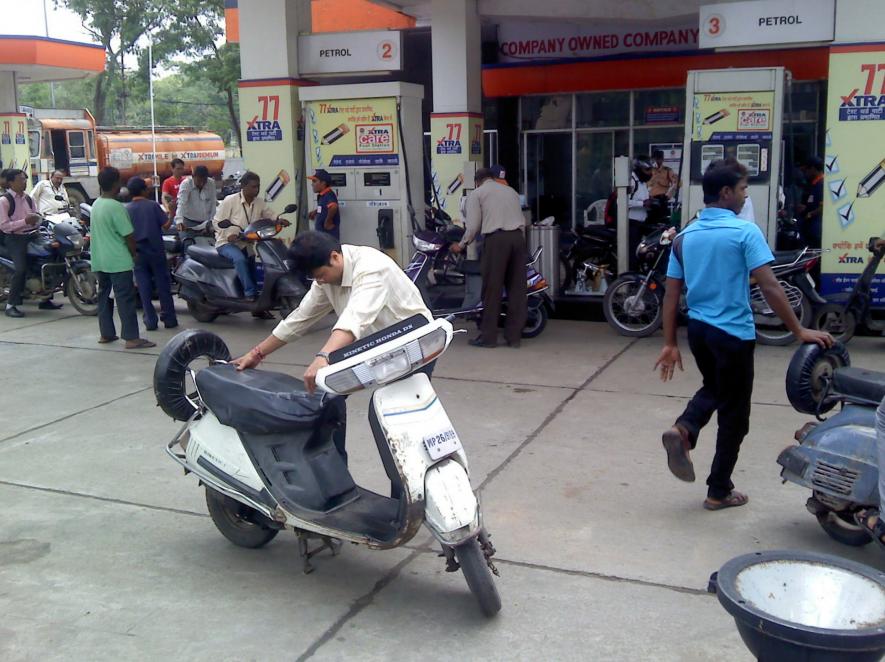Petrol Price Hike and Modi Govt’s Hypocrisy

Representational Image. | Image Courtesy: Wikimedia Commons
Petrol and diesel prices in the country have been hiked 12 times, with more such daily hikes in the offing. On each occasion, the hike had been by at least 80 paise per litre, so the price per litre of petrol in Delhi is now over Rs 100 a litre and diesel around Rs 93 a litre.
The explanation for these hikes is that the prices for the companies had remained frozen for some time (because of the elections in several states) even as international oil prices were rising, with the companies absorbing the rise. Now that they have been allowed to raise their prices, they are catching up, and the burden has to be borne by the consumer, since the government cannot afford to lose any revenue by reducing taxes per litre.
The last time that petro-product prices had been hiked by the oil companies was on November 4 last year. For 137 days after that, it is argued, there had been no price-increase for the companies. During this period, however, there had been a rise in crude oil price in the international market from $82 per barrel to $117 per barrel, which meant a loss of revenue for the public sector oil companies alone of $2.25 billion, or Rs 19,000 crore. (Though the prices have declined a bit after this article was written).
Oil companies now have to adjust their prices upward to prevent such revenue losses. In fact, if world oil prices stabilise at $100, then the increase in retail price of petrol will have to be Rs 9-12 per litre for a full “pass-through”, whence it follows that if the governments, both at the Centre and the state level, are not to suffer any revenue loss, then petrol prices will have to increase even further, by another Rs 7 per litre or thereabouts in Delhi if the world crude-oil price stabilises at $100 a barrel.
This argument, however, misses the main point. As the companies raise their prices, it causes not just retail price inflation in petro-products, but a general inflation in the economy because of its cost-push effects. This also raises the expenditure of the government in money terms in order to achieve the same real spending targets, for which the government has to raise its revenue as well. This means that the government, too, has to raise the nominal taxes on petro-products to garner larger revenue to meet the same real spending targets.
The act of increasing petro-product prices, in short, does not remain confined to the oil companies alone. It has a multiplier effect: it is necessarily followed, down the line, by all those entities that claim a share of the retail price of petro-products. The rise in inflation then is much larger.
Prices can at all reach a plateau in such a situation only if some people’s money incomes do not rise to compensate them for the price-rise, that is, if there are some who are only “price-takers” and not “price-makers”. These can only be the working people.
In other words, the fiscal strategy of raising resources for the government through taxing petro-products, necessarily presumes that the working people will be hurt by it. If they are not hurt, and their money incomes rise alongside inflation, then there will be no end to inflation. Hurting the working people, therefore, is the raison d’etre of this entire strategy. To adopt such a fiscal strategy and at the same time to shed tears for the working people, is the height of hypocrisy.
The point to note here is that there is no automaticity about the rise in the retail prices of petro-products just because world crude oil prices have risen; one is not the inevitable consequence of the other. The rise in retail prices of petro-products is a fiscal strategy; these retail prices have to rise if there is a rise in world crude prices only because of this fiscal strategy, and only if the fiscal strategy remains unchanged.
To talk about the inevitability of the rise in the retail prices of petro-products is to take this fiscal strategy itself as inevitable, and, therefore, to conceal from the people the fact that it is a chosen strategy, a deliberate act of choice. In fact, at present, the taxes imposed by the Central and state governments account for more than half of the retail price of petrol.
The case of the state governments is understandable: they have very few sources of revenue which they can tap at their discretion. After the introduction of GST (goods and services tax), the area of discretion has shrunk quite sharply, and petro-products happen to be one of the three commodities where the rates are not fixed by the GST Council but can be fixed at the state government’s discretion. State governments’ taxing petro-products, therefore is quite understandable; they have little choice in the matter, since they have no ability to impose direct taxes.
But the Central government has ample scope for raising resources through other means, which it is deliberately not using. Its resort to taxing petro-products instead of imposing direct taxes on the rich is, therefore, a choice made on its part. It is a class bias; there is nothing inevitable about it.
It may be thought that petro-products are used mainly by the rich, so that taxing them does not impinge seriously on the poor; but this is wrong for at least three reasons. First, among petro-products there are many that are directly used by the working people, an obvious example being cooking gas. Second, a rise in petro-product prices raises transport costs, because of which all commodity prices rise, including even basic commodities like foodgrains that enter so strongly into the consumption basket of the poor.
Third, even if petro-products entered neither directly nor indirectly into the production or transport of the goods used by the working people, and entered only into the production of goods needed by the capitalists, for the latter to maintain their real command over these goods they would raise their profit mark-up and hence the prices even of goods consumed by the working people. Hence an increase in petro-product prices hurts the poor, not so much the rich, who can take steps to protect themselves against inflation, and do take these steps.
It is perfectly possible to keep petro-product prices unchanged (and even lower them) despite the rise in crude oil prices in the world market, by moving to an alternative fiscal strategy that relies on direct taxes on the rich for raising revenue; prominent among such taxes are wealth and inheritance taxes. But, it may be asked, what about reducing the domestic consumption of petro-products that becomes especially necessary when crude prices rise in dollars; how can that be achieved without a rise in prices?
Those who are not “price-takers” but “price-makers” can manage to keep their real absorption of petro-products intact; the only group whose absorption of such products may shrink, as we have seen, is the group of “price-takers”, namely the working people. Even in their case the effort generally would be to economise on the consumption of other goods to maintain the absorption of petro-products, so that a recession is generated in the economy causing even larger unemployment; and indeed it is this which becomes the means of effecting a cut in absorption.
But a more sure, non-immiserising, non-inflationary and non-recessionary (i.e., non-stagflationary) means of effecting a cut in absorption of petro-products is to introduce statutory rationing alongside price-control.
Rationing is a means of introducing fairness in the distribution of petro-products across the population. The implicit rationing introduced through price-rise is essentially inegalitarian; but direct rationing, while the retail price is controlled, provides a more egalitarian distribution of petro-products across the population.
Coping with the situation arising from the rise in world crude oil prices requires, therefore, a combination of policies: a fiscal policy that relies on direct taxes on the rich; a control on the retail prices of petro-products and even a reduction in these prices; and quantitative rationing in the distribution of petro-products to keep the total crude imports restricted rather than relying on a price-rise in these products for doing so.
But, if instead of this policy-mix we insist on using the policy-mix that we have been adopting till now, then the country is headed for very sad times.
Get the latest reports & analysis with people's perspective on Protests, movements & deep analytical videos, discussions of the current affairs in your Telegram app. Subscribe to NewsClick's Telegram channel & get Real-Time updates on stories, as they get published on our website.























